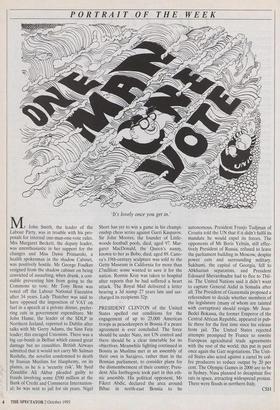PORTRAIT OF THE WEEK
'It's lovely once you get in.' Mr John Smith, the leader of the Labour Party, was in trouble with his pro- posals for internal one-man-one-vote rules. Mrs Margaret Beckett, the deputy leader, was unenthusiastic in her support for the changes and Miss Dawn Primarolo, a health spokesman in the shadow Cabinet, was positively hostile. Mr George Foulkes resigned from the shadow cabinet on being convicted of assaulting, when drunk, a con- stable preventing him from going to the Commons to vote. Mr Tony Benn was voted off the Labour National Executive after 34 years. Lady Thatcher was said to have opposed the imposition of VAT on fuel in a speech at a private dinner, prefer- ring cuts in government expenditure. Mr John Hume, the leader of the SDLP in Northern Ireland, reported to Dublin after talks with Mr Gerry Adams, the Sinn Fein leader; this enraged Unionists. There was a big car-bomb in Belfast which caused great damage but no casualties. British Airways admitted that it would not carry Mr Salman Rushdie, the novelist condemned to death by Iranian Muslims for blasphemy, on its planes, as he is a 'security risk'. Mr Syed Ziauddin Ali Akbar pleaded guilty to frauds involving some £500 million at the Bank of Credit and Commerce Internation- al; he was sent to jail for six years. Nigel Short has yet to win a game in his champi- onship chess series against Garri Kasparov. Sir John Moores, the founder of Little- woods football pools, died, aged 97. Mar- garet MacDonald, the Queen's nanny, known to her as Bobo, died, aged 89. Cana- va's 19th-century sculpture was sold to the Getty Museum in California for more than i7million; some wanted to save it for the nation. Ronnie Kray was taken to hospital after reports that he had suffered a heart attack. The Royal Mail delivered a letter bearing a 3d stamp 27 years late and sur- charged its recipients 32p.
PRESIDENT CLINTON of the United States spelled out conditions for the engagement of up to 25,000 American troops as peacekeepers in Bosnia if a peace agreement is ever concluded. The force should be under Nato, not UN control and there should be a clear timetable for its objectives. Meanwhile fighting continued in Bosnia as Muslims met in an assembly of their own in Sarajevo, rather than in the Bosnian parliament, to consider plans for the dismemberment of their country; Presi- dent Alia Izetbegovic took part in this eth- nic assembly. His political opponent, Mr Fikret Abdic, declared the area around Bihac in north-east Bosnia to be autonomous. President Franjo Tudjman of Croatia told the UN that if it didn't fulfil its mandate he would expel its forces. The opponents of Mr Boris Yeltsin, still effec- tively President of Russia, refused to leave the parliament building in Moscow, despite power cuts and surrounding military. Sukhumi, the capital of Georgia, fell to Abkhazian separatists, and President Edouard Shevardnadze had to flee to Tbil- isi. The United Nations said it didn't want to capture General Aidid in Somalia after all. The President of Guatemala proposed a referendum to decide whether members of the legislature (many of whom are tainted with corruption) should resign. Mr Jean- Bedel Bokassa, the former Emperor of the Central African Republic, appeared in pub- lic there for the first time since his release from jail. The United States rejected attempts prompted by France to rewrite European agricultural trade agreements with the rest of the world; this put in peril once again the Gatt negotiations. The Unit- ed States also acted against a cartel by cof- fee producers to reduce output by 20 per cent. The Olympic Games in 2000 are to be in Sydney. Nasa planned to decapitate five rats in space, attracting widespread protest. There were floods in northern Italy.
CSH


















































 Previous page
Previous page